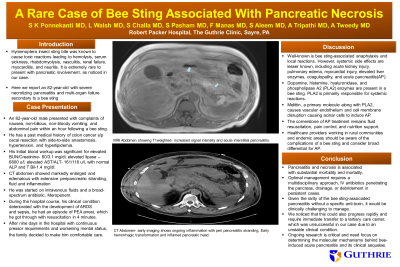Back


Poster Session A - Sunday Afternoon
Category: Biliary/Pancreas
A0059 - A Rare Case of Bee Sting Associated With Pancreatic Necrosis
Sunday, October 23, 2022
5:00 PM – 7:00 PM ET
Location: Crown Ballroom

Has Audio
- SP
Sravan K. Ponnekanti, MD
Guthrie Robert Packer Hospital
Sayre, PA
Presenting Author(s)
Sravan K. Ponnekanti, MD1, Leonard Walsh, MBBS2, Suryanarayana Reddy Challa, MD3, Sudhir Pasham, MD1, Fnu Manas, MD2, Muhammad Sarmad Aleem, MD2, Anusha Tipparthi, MBBS4, Agatha Tweedy, MD2
1Guthrie Robert Packer Hospital, Sayre, PA; 2Robert Packer Hospital, Sayre, PA; 3Howard University Hospital, Washington, DC; 4Osmania Medical College, Hyderabad, Telangana, India
Introduction: Hymenoptera insect sting bite was known to cause toxic reactions leading to hemolysis, serum sickness, rhabdomyolysis, vasculitis, renal failure, myocarditis, and neuritis. It is extremely rare to present with pancreatic involvement, as noticed in our case. Here we report an 82-year-old with severe necrotizing pancreatitis and multi-organ failure secondary to a bee sting.
Case Description/Methods: An 82-year-old male presented with complaints of nausea, non-bilious, non-bloody vomiting, and abdominal pain within an hour following a bee sting. He has a past medical history of colon cancer s/p cecal resection with side-to-side anastomosis, hypertension, and hyperlipidemia. His Initial blood workup was significant for elevated BUN/Creatinine- 60/3.1 mg/dl, elevated lipase –6800 u/l, elevated AST/ALT- 161/116 u/l, with normal ALP and T Bil-1.4 mg/dl. CT abdomen with IV contrast showed peripancreatic inflammatory changes with fluid extending into the perirenal and paracolic gutters, hypoenhancement of the pancreatic body and tail concerning pancreatic necrosis. He was started on intravenous fluids and a broad-spectrum antibiotic, Meropenem. During the hospital course, his clinical condition deteriorated with the development of sepsis, and he had an episode of PEA arrest, which he got through with resuscitation in 4 minutes. After nine days in the hospital with continuous pressor requirements and worsening mental status, the family decided to make him comfortable care.
Discussion: Pancreatic necrosis is associated with substantial morbidity and mortality. Optimal management requires a multidisciplinary approach, IV antibiotics penetrating the pancreas, drainage, or debridement in persistent cases. Given the rarity of the bee sting-associated pancreatitis without a specific anti-toxin, it would be clinically challenging to manage. We noticed that this could also progress rapidly and require immediate transfer to a tertiary care center, which was unsuccessful in our case due to an unstable clinical condition.
Disclosures:
Sravan K. Ponnekanti, MD1, Leonard Walsh, MBBS2, Suryanarayana Reddy Challa, MD3, Sudhir Pasham, MD1, Fnu Manas, MD2, Muhammad Sarmad Aleem, MD2, Anusha Tipparthi, MBBS4, Agatha Tweedy, MD2. A0059 - A Rare Case of Bee Sting Associated With Pancreatic Necrosis, ACG 2022 Annual Scientific Meeting Abstracts. Charlotte, NC: American College of Gastroenterology.
1Guthrie Robert Packer Hospital, Sayre, PA; 2Robert Packer Hospital, Sayre, PA; 3Howard University Hospital, Washington, DC; 4Osmania Medical College, Hyderabad, Telangana, India
Introduction: Hymenoptera insect sting bite was known to cause toxic reactions leading to hemolysis, serum sickness, rhabdomyolysis, vasculitis, renal failure, myocarditis, and neuritis. It is extremely rare to present with pancreatic involvement, as noticed in our case. Here we report an 82-year-old with severe necrotizing pancreatitis and multi-organ failure secondary to a bee sting.
Case Description/Methods: An 82-year-old male presented with complaints of nausea, non-bilious, non-bloody vomiting, and abdominal pain within an hour following a bee sting. He has a past medical history of colon cancer s/p cecal resection with side-to-side anastomosis, hypertension, and hyperlipidemia. His Initial blood workup was significant for elevated BUN/Creatinine- 60/3.1 mg/dl, elevated lipase –6800 u/l, elevated AST/ALT- 161/116 u/l, with normal ALP and T Bil-1.4 mg/dl. CT abdomen with IV contrast showed peripancreatic inflammatory changes with fluid extending into the perirenal and paracolic gutters, hypoenhancement of the pancreatic body and tail concerning pancreatic necrosis. He was started on intravenous fluids and a broad-spectrum antibiotic, Meropenem. During the hospital course, his clinical condition deteriorated with the development of sepsis, and he had an episode of PEA arrest, which he got through with resuscitation in 4 minutes. After nine days in the hospital with continuous pressor requirements and worsening mental status, the family decided to make him comfortable care.
Discussion: Pancreatic necrosis is associated with substantial morbidity and mortality. Optimal management requires a multidisciplinary approach, IV antibiotics penetrating the pancreas, drainage, or debridement in persistent cases. Given the rarity of the bee sting-associated pancreatitis without a specific anti-toxin, it would be clinically challenging to manage. We noticed that this could also progress rapidly and require immediate transfer to a tertiary care center, which was unsuccessful in our case due to an unstable clinical condition.
Disclosures:
Sravan Ponnekanti indicated no relevant financial relationships.
Leonard Walsh indicated no relevant financial relationships.
Suryanarayana Reddy Challa indicated no relevant financial relationships.
Sudhir Pasham indicated no relevant financial relationships.
Fnu Manas indicated no relevant financial relationships.
Muhammad Sarmad Aleem indicated no relevant financial relationships.
Anusha Tipparthi indicated no relevant financial relationships.
Agatha Tweedy indicated no relevant financial relationships.
Sravan K. Ponnekanti, MD1, Leonard Walsh, MBBS2, Suryanarayana Reddy Challa, MD3, Sudhir Pasham, MD1, Fnu Manas, MD2, Muhammad Sarmad Aleem, MD2, Anusha Tipparthi, MBBS4, Agatha Tweedy, MD2. A0059 - A Rare Case of Bee Sting Associated With Pancreatic Necrosis, ACG 2022 Annual Scientific Meeting Abstracts. Charlotte, NC: American College of Gastroenterology.
